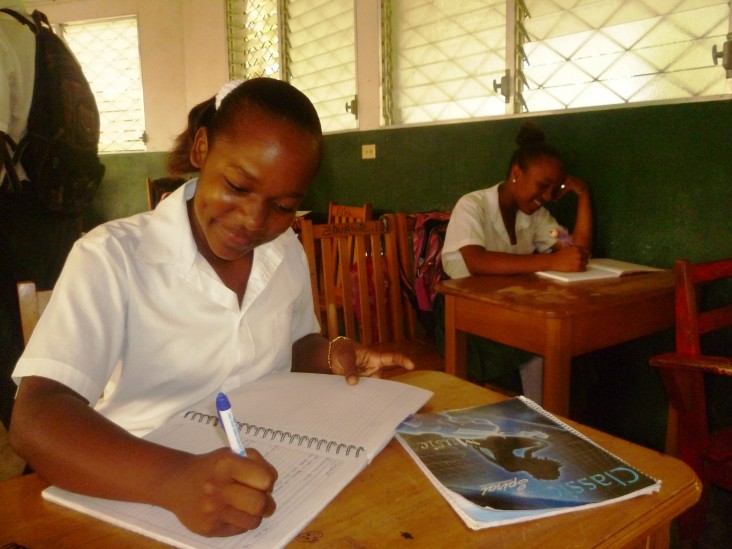
“I want to become a doctor,” says Macrina Marie Sambola Pondler with a bright smile. The 17-year old is the second of four children of an unemployed couple living in the South Atlantic Autonomous Region (RAAS) in Nicaragua. There was a time when Macrina’s dream would have been impossible. At age 15, finishing sixth grade and facing reading and integration difficulties, Macrina’s mother was thinking of taking her out of school and helping her find a job so as to provide needed support for the family.
Examples such as this have been all too common in the RAAS. The region, which covers roughly a fourth of Nicaragua’s total territory, presents unique development challenges stemming from the lack of sustained investment efforts by the government of Nicaragua. Economic and education opportunities are scarce in the region. This historically marginalized part of Nicaragua – a country that is itself the second poorest in the western hemisphere -- has the lowest indices for primary education in the country. According to official sources, the average number of years of schooling in the RAAS is 2.9 years, compared to the national average of 5.2 years. It is estimated that in Nicaragua approximately 500,000 students who should be enrolled in school are not, over 70 percent of which are on the Atlantic Coast. Hindered by a lack of education, young adults become caught up in the depressing cycle of illiteracy, teen pregnancy, domestic violence and substance abuse or narco-trafficking. Many youth leave their hometowns in search of economic opportunities, venturing to the capital and neighboring countries. This places severe pressure on family and community cohesion, contributing to the loss of family ties - a key factor in youth vulnerability to anti-social behaviors.
To provide a second chance for youth in the RAAS, USAID is working through a local partner, Foundation for Autonomy and Development of the Atlantic Coast of Nicaragua (FADCANIC), to implement the $6.7 million Education for Success (EFS) project. Through this project, USAID seeks to engage youth at risk in formal or non-formal educational activities, increase their capacity to contribute to their communities, and to provide them with the technical or academic training and social skills they need to succeed. In order to do this, the EFS project aims to achieve four core objectives: 1) Help primary and secondary school students overcome the economic and social barriers that keep them from completing formal education, 2) Provide scholarships to adolescents and young adults who have dropped out of primary and secondary school for equivalency courses, vocational training, and life skills education, 3) Nurture social skills to help youth gain a strong sense of self-worth (responsibility, empathy, cooperation, assertiveness, and communication) and provide opportunities for youth to build their capacity to exercise restraint, tolerate stress, solve problems and raise levels of self-esteem, and 4) Engage the private and public sectors to facilitate insertion of beneficiaries to the job market.
In addition to the scholarship component, EFS supports youth activities through the formation of Community At-risk Youth Advisory Committees (CAYACs), which help to identify and monitor the progress of project beneficiaries in the formal and non-formal programs. The Project also coordinates with other local stakeholders, including the youth office of the National Police, the regional autonomous government, the Ministry of Education, civil society and other NGOs to jointly address issues related to youth at risk, thus bringing together otherwise disperse efforts.
Macrina has been part of the Education for Success project for two years now; her scholarship provides her with books, a uniform, shoes, and other materials needed for school, as well as supporting her participation in life-skills training and sports activities. Through EFS, she has also received extra tutoring and self-esteem support so she could overcome the difficulties of integrating with the rest of her class in school. However, this year she needed extra help to stay in the education system. It was due to advocacy on the part of the CAYAC, teachers and local education authorities that Macrina’s mother has agreed that staying in school will result in improved chances for both Macrina’s personal success and the family’s economic situation in the long run. She has realized that education outweighs the potential quick economic gains that the family would get if Macrina left school, which could put Macrina’s future at imminent risk. “She has made tremendous gains and has shown positive changes in her attitude and performance. She has not missed a day of school this year and is on her way to achieving a proper education that can open doors for her,” said Lisa Powell, regional promoter of the EFS. Macrina’s dream of becoming a doctor, once in jeopardy, is now within her reach.







Comment
Make a general inquiry or suggest an improvement.